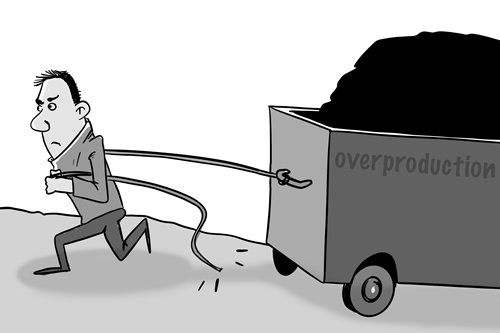HOME >> BUSINESS
Lacking market space, German economy trapped in overproduction ‘black hole’
Source:Global Times Published: 2019/10/28 23:28:40

Illustration: Luo Xuan/GT
After nine consecutive years of growth, Germany's economy is expected to enter a technical recession in the third quarter of 2019. The country's leading economic institutes have already lowered their economic growth forecasts, expecting the economy to grow by 0.5 percent this year and by 1.1 percent next year.
Germany has the world's most advanced manufacturing industry and exports high-quality manufactured goods worldwide. How is it also facing the risk of an economic recession? Global central banks are continuously cutting interest rates and the European Central Bank is keeping rates low. Why is there still a slowdown in the German economy? Some observers claim that Germany is stuck in a "black hole economy," meaning that despite low interest rates and sufficient funds, it is still difficult to stimulate the economy as all economic resources appear to have been swallowed.
On the surface, a deepened manufacturing plight is the major cause of Germany's current economic situation. According to the Federal Ministry for Economic Affairs and Energy, "the export-oriented German industry continued to suffer from declining world trade and stagnating global industrial trends." Economists are generally concerned that the slowdown in manufacturing will spread to other industries in Europe's largest economy, and Germany's labor market has already begun to suffer.
The entire German manufacturing industry is currently overshadowed by the economic slowdown. Daimler and BMW recently announced cost cuts. Bosch, the world's No.1 auto parts supplier, and Continental, No.4, have both rolled out plans for job cuts. Piston manufacturer Mahle has already closed a local factory.
The German manufacturing predicament is tied the current era of overproduction. Today, economic suffering is directly related to the strength of a country's manufacturing industry and the proportion of manufacturing in its economy. Moreover, the trade war has added trouble to the German manufacturing industry, which is highly dependent on exports. The proportion of manufacturing in Germany's GDP is the highest among developed countries, and its top 10 export products, ranging from automobiles to aircraft, are all manufactured goods. However, manufacturing now seems like a "double-edged sword," which is both Germany's strength and the reason for its current difficulties. In the past, Germany relied mainly on exports to Europe, which have yet to recover from the European debt crisis. The eurozone economy grew by just 0.2 percent on a quarterly basis in the second quarter of 2019, a decrease from 0.4 percent in the first quarter.
Germany's manufacturing base has become so dominant that it has long overshadowed the development of other industries. Thus when its manufacturing exports languish, no other sectors are able to lift the economy. As an advanced country, Germany lags behind others in terms of digital development. According to the EU Digital Economy and Society Index, Germany doesn't even rank in the top 10 among the 28 EU countries.
In our view, the cause of the German predicament is related to the new stage of world economic development - we have entered a buyer's world. In a buyer's world, the most valuable things are not cheap products or abundant supplies of commodities, but the size of the economy and purchasing power. Total consumption strength and a country's market determine everything. The formation of the buyer's world is also tied to overproduction, which has been driven by the advancement of science and technology, the global division of labor, the abundance of cheap labor from developing countries, the arrival of an information society, and the development of internet commerce.
When there is massive overproduction, countries with a large market will hold a unique competitive advantage. By comparison, manufacturing countries that used to play a leading role in the era of shortage are now facing passivity. If the surplus products cannot be monetized in the market, what's the point of such production and capacity? It would only lead to an excess production line, accumulated inventory, idle factory buildings, inflated debt, potential financial risks, massive energy consumption and environmental pollution.
In short, production capacity that cannot be monetized in the market has no value. If such capacities belong to the relatively low end of the value chain, they are more likely to be eliminated. Over the years, we have repeatedly placed an emphasis on the "Chinese market," because we want to point out that, in addition to being the "world's factory," China also has a marketplace that the buyer's world values. Manufacturing countries that lack the domestic market space will be seriously affected in future competition and in the future of the trade war.
In the buyer's world, manufacturing countries often face overproduction, which tends to form different levels of a "black hole economy," consuming the vitality of economic development.
The article was compiled based on a report by Beijing-based private strategic think tank Anbound. bizopinion@globaltimes.com.cn
Posted in: EXPERT ASSESSMENT